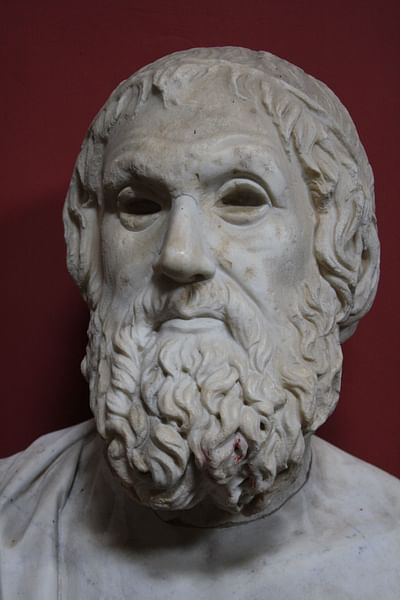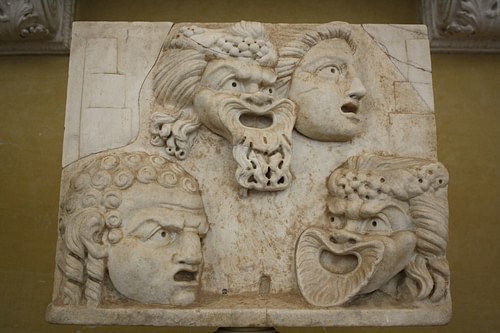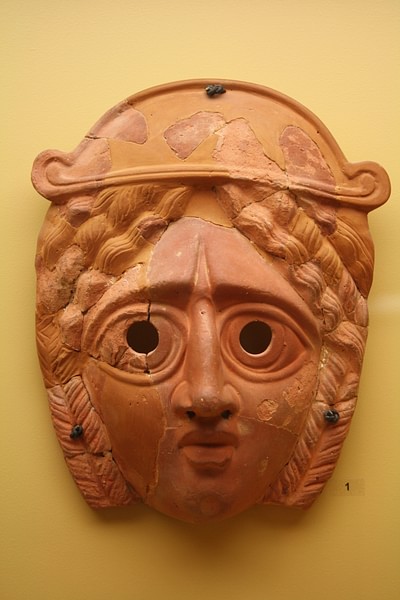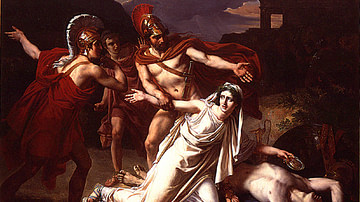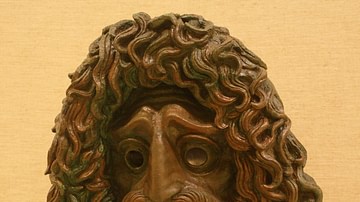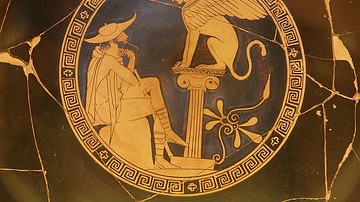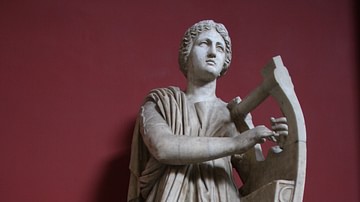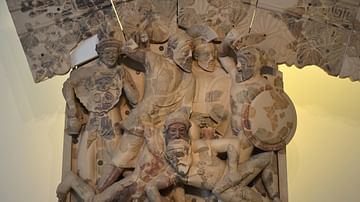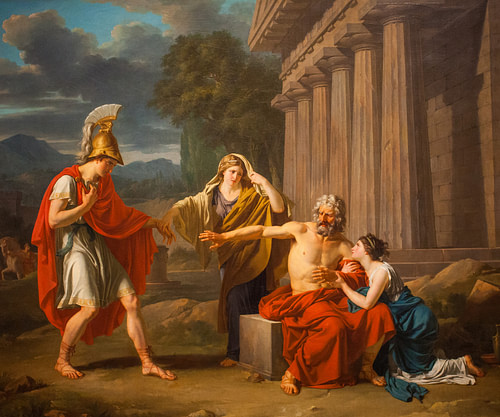
Oedipus at Colonus was the third play of the Oedipus trilogy written by the great Greek tragedian Sophocles (c. 496 - c. 406 BCE). Although written in the years prior to his death, it would finally be presented by his son Iophon at a dramatic competition in 401 BCE. The play's sequel Antigone was actually written years earlier in 441 BCE. Oedipus at Colonus accounts for the final years of the fallen king, 20 years after his exile from Thebes. Blind, weak and dressed in rags, he accepted his fate and wandered from town to town as an outcast accompanied only by his young daughter Antigone. Arriving outside Athens at Colonus, he is befriended by the king of Athens, Theseus, who offers him protection. Oedipus speaks of a prophecy that says whatever city grants him sanctuary will be given special protection. Knowledge of this prophecy comes to the attention of Creon, his brother-in-law, and his son Polyneices who want to take advantage of the blinded king. Both had coldly refused him shelter in the past but now travel to Colonus to offer him sanctuary.
Sophocles
Along with Aeschylus and Euripides, Sophocles represents the greatest of the Greek playwrights. In the 4th and 5th centuries BCE, Greek tragedians performed their plays in outdoor theaters at various festivals and rituals in a series competitions. The purpose of these tragedies was to not only entertain but also to educate the Greek citizen, to explore a problem. Along with a chorus of singers to explain the action, there were actors often three (later four or more and always male) who wore masks and costumes. Although he was often considered a passionless observer of life, classicist Edith Hamilton in her book The Greek Way believed Sophocles was the embodiment of what we believe to be Greek. “He is direct, lucid, simple, reasonable. Excess - the word is not to be mentioned in his presence. Restraint is his as no other writer's” (199).
Sophocles was born into a wealthy family in the small Athenian suburb of Colonus, the site of his play. He was active in Athenian public life serving as treasurer, general and envoy. Later, because he was so respected, he became a member of a group of magistrates given the task of organizing finances and domestic affairs after the disastrous defeat of Athens at Syracuse (412-411 BCE). Although active in Athenian political circles, his plays rarely contain any references to current events or issues, making the dating of his plays difficult. He had two sons (one by his wife and one by his mistress); Iophon and Ariston both became playwrights.
The myth
All three plays are based on an old myth which was quite familiar to the audience. In Oedipus the King, Oedipus fulfills a prophecy that foretold that he would murder his father and marry his mother. At Oedipus' birth, his father, hoping to avoid his own fate, had his son taken away. Providence, however, interceded, and the young boy was raised by the king and queen of Corinth. Unfortunately, Oedipus learned of the prophecy and unknowingly believing it meant his adoptive parents, he left Corinth. On route to Thebes, he got into an altercation and killed a man who happened to have been the Theban king, his real father. Upon arriving in the city, he saved the people by solving the riddle of the Sphinx and was rewarded by marrying the now-widowed queen (his mother). Years later when the truth was finally revealed, the queen committed suicide and Oedipus blinded himself and went into exile. Although Sophocles chose to exile Oedipus, various authors have viewed the outcome differently; both Homer and Euripides have him remain in Thebes although relinquishing the throne. Now, in Sophocles' final play the story continued as Oedipus realized that he was near death and decided to choose a final resting place.
Characters
Oedipus at Colonus has a rather small cast of central characters:
- Oedipus
- his daughter Antigone
- his other daughter Ismene
- Theseus
- Creon
- Polyneices
- a stranger
- a messenger
- and, of course, the chorus.
To many, the Oedipus in Oedipus at Colonus is not the same character as in Oedipus the King. Paul Roche in his translation of the Oedipus plays believed in Oedipus at Colonus the former king finally accedes to his fate and thereby rises to a restored sense of dignity, becoming a vehicle of divine justice. To Michael Grant in his The Classical Greeks, the storyline of Oedipus has been modified so that the former king does not sin but has been sinned against. Editor Moses Hadas in his book Greek Drama said that at the time of the play's writing Athens was beginning its gradual decline, and Sophocles returned to the story of Oedipus as a farewell to both the city and the stage. Theseus is included in the play “to glorify Athenian traditions of justice and generosity…” (167).
The plot
The play begins at a grove in Colonus just outside Athens. As Antigone and Oedipus enter the grove, the former king turns to his daughter and says:
My daughter - daughter of the blind old man - where have we come to now, Antigone? What lands are these or holdings of what city? Who will be kind to Oedipus this evening and give alms to the wanderer? (145)
Recognizing the area as Athens, she describes the grove to her father and guides him to a large, flat rock. A lone stranger approaches from a distance and reprimands Oedipus for sitting on the rock, for it is considered to be holy, an area dedicated to the master horseman Colonus. He tells them that they must move and informs them that the land is governed by Theseus, son of Aegeus. Oedipus requests that the stranger go and seek Theseus, telling him that a little kindness will gain him much. After the stranger leaves, Oedipus turns to Antigone and says:
I have first bent my knees in this new land, therefore be mindful of me and of Apollo. For when he gave me oracles of evil, he also spoke of this, a resting place I should find home among the sacred Furies; that I might round out there my bitter life. (150)
He tells her that the place that accepts him will receive benefits but the ones that have driven him away will be cursed. After Antigone and Oedipus move away from the sacred rock, the chorus enters (they had been sent by the stranger) and, upon seeing the father and daughter, immediately asks the old king and daughter to come forward. They tell Oedipus to identify himself. Oedipus only replies that he is an exile and begs them not to ask anything more. After further questioning, he finally admits that he is the ruined Oedipus and adds that he is cursed. Their reaction is immediate: "Away with you? Out with you? Leave our country.” (156) Oedipus pleads with them to give him shelter. Antigone speaks on her father's behalf asking them to have mercy on a beaten man. Understanding Oedipus' plea, they decide to leave the matter in the hands of Theseus.
As they wait for Theseus' arrival, Ismene, Oedipus' second daughter, appears, bringing news from Thebes. Her brother Polyneices has been betrayed, stripped of his power and exiled, fleeing to Argos where he hopes to raise an army and return to conquer Thebes. With the problems brewing in Thebes, Ismene wonders how long it will be before the gods have pity on him. She speaks of a prophecy from the Delphi oracle that says “… you shall be much solicited by our people before your death - and after - for their welfare” (163). She adds that the gods that once threw him out will now sustain him. Over time Oedipus has realized that he had acted hastily and now understands that his punishment has been far greater than his crime. Ismene warns him that Creon is on his way to take him back to settle him near Thebes. Hearing the conversation between Ismene and Oedipus, the chorus leader speaks:
Oedipus, you are surely worth our pity: you, and your children, too. And since you claim also to be a savior of our land, I'd like to give you counsel for good luck. (167)
Soon after Ismene leaves, Theseus arrives at the grove and immediately recognizes Oedipus. He wonders what the old blinded king wants. Oedipus speaks of his sons and the family curse and how the Delphi oracle compels them to summon him. Realizing his plight, Oedipus asks only to remain in Athens.
I was expelled from my own land by my own sons, and now, as a parricide, my return is not allowed. [...] Here I shall prevail over those who banished me. (174, 176)
Theseus promises that he will not betray Oedipus and no one will be allowed to take him against his will. Soon after Theseus leaves, Creon approaches with a number of soldiers. He advances towards Oedipus, Antigone, and the chorus. He turns to Oedipus and asks him to come home:
I see from your eyes that my arrival has been a cause of sudden fear to you. Do not be fearful and say nothing hostile. I have not come for any hostile action. [...] I grieve for your unhappiness, old man. I see you ravaged as you are, a stranger everywhere, never at rest with only a girl to serve you in your need. (180-181)
He says that poor Antigone has been leading a beggar's life, never knowing marriage; it is a disgrace. Of course, Oedipus does not believe him, calls him a rascal, and asks him to leave him and his daughter alone. However, Creon gives him a dire warning and informs him that he has already taken Ismene captive. His soldiers grab Antigone. The soldiers drag Antigone away, and as Creon grabs Oedipus, Theseus arrives with a small army of his own. He is told that Antigone and Ismene have been taken prisoner. Turning to Creon, he warns him:
You shall never leave this land of Attica until you produce those girls here in my presence. (190)
Creon responds saying he did not know Athens was a place for exiles. He claims that Oedipus had placed a curse on him and his people; it was an injury that deserved retaliation. Theseus tires of Creon's excuses, and shortly after Theseus and Creon leave, the Athenian king returns with both Antigone and Ismene. Oedipus is elated:
I have what is dearest to me in the world to die now would not be so terrible since you are near me. (197)
However, his happiness is short-lived, for he received word that a man claiming to be a relative has been asking about him in Athens. Theseus said the man was found praying at the altar of Poseidon. Oedipus realizes that it must be his son Polyneices. Antigone begs his father to listen Polyneices, and Oedipus agrees. Polyneices arrives and addresses his father. He tells them that he is a fugitive, too. He was banished from Thebes and had found asylum in Argos, where he hopes to raise an army and return to Thebes. He asks for forgiveness and begs his father to come with him. He will defeat his brother and bring Oedipus home to Thebes. Oedipus rejects his offer and informs him that he will not defeat his brother. Polyneices will die by his brother's hands, and his brother will die by his.
I abominate and disown you wretched scum. Go with this malediction I here pronounce for you that you will never master you native land by force of arms. (207)
As Polyneices departs, Oedipus and his daughters hear thunder. Oedipus realizes that the end is near and asks for Theseus in order to give him his blessing and fulfill his promise for Athens. The thunder is from Zeus, and it is a sign that it is time for him to die. Speaking to his daughters, he tells them that he will take only Theseus with him to the place where he will die, and adds that the Athenian king must not disclose it to anyone. Oedipus takes his daughters and Theseus to where the angel of death, Hermes, and Persephone lead him.
Shortly, a messenger arrives to speak to the chorus. Oedipus is dead. He tells of the old king's final moments. With his daughters weeping, he told them they no longer had to bear the burden of caring for him, but he reminded them that they were not to witness his death. Theseus was the only one permitted to stay and see his final resting place. Later, when Theseus returned to a solemn Antigone and Ismene, they asked if they could see his final resting spot, but he said no. Antigone regrettably accepts her father's last wishes and simply adds that she will return to Thebes with a hope to stop the war between her brothers.
Oedipus redeemed
As he approached his own death, Sophocles wrote the play as the long and unpopular war between Sparta and Athens was being fought and Spartan forces sat on the edge of the city. The play was a final homage to his city and beloved stage. In Oedipus at Colonus the blinded, fallen king dies. After 20 years as an outcast, Oedipus had arrived at Colonus with the hope that his odyssey was finally at an end. However, his death was not to be in vain. He was befriended by Theseus who was promised that Athens would receive special protection for having granted him sanctuary. Unfortunately, he learned that he was being pursued by his old nemesis Creon and his treacherous son Polyneices. In the end, he and his daughters were saved, and he finally found the rest that he had sought. In Oedipus at Colonus, he came to realize that his suffering far exceeded his crime. He had acted in haste. Now, as he approached his death, he understood that he was not the victimizer but a victim. He was able to die with a restored sense of dignity.
